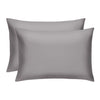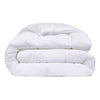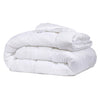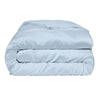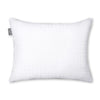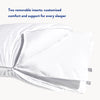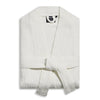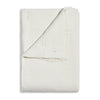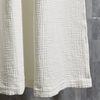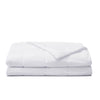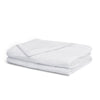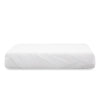The Daily Miracle
Silk Vs Bamboo Sheets: What's The Difference?
Published
September 20, 2025
Author
John Tsenekos
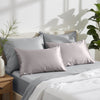
Deciding between silk vs bamboo sheets can feel tricky, especially when comfort, skin health, and eco-friendliness are all on the table. With both materials boasting luxury, sustainability, and breathability, it’s easy to get overwhelmed trying to choose. This guide will walk you through the key differences, exploring texture, durability factors, care instructions, ease of care, and cost so you can make an informed choice that improves your sleep quality and suits your sleep needs. Let’s uncover what makes silk and bamboo sheets unique and how to pick your ultimate bedding fit.
What Are Silk Sheets?
Silk sheets are woven from the natural protein fibers produced by silkworms, creating a luxurious feel. Treasured in Asia for centuries, silk is synonymous with luxury thanks to its smooth, soft texture and elegant sheen. The production process involves unraveling long, continuous filaments, giving silk its unmatched softness and beautiful drape. As a temperature-regulating fabric, silk keeps you cool during hot weather and warm when it’s chilly. Its time-intensive production contributes to its higher price, but the comfort and indulgence it offers make it a worthwhile upgrade for many seeking premium bedding.
Silk bedding is also naturally hypoallergenic, making it a safe choice for sensitive sleepers prone to irritation or seasonal allergies. However, silk requires delicate care hand washing or professional cleaning and its durability doesn't always stand up to everyday wear in busy households. For many, silk remains an aspirational option that emphasizes beauty and indulgence over practicality.
What Are Bamboo Sheets?
Bamboo sheets are crafted from fibers taken from the bamboo plant, a highly sustainable and fast-replenishing resource. Typically made from bamboo lyocell, viscose, or rayon through a chemical process, these sheets are celebrated for balancing luxury and affordability. They’re incredibly soft, hypoallergenic, breathable, and gentle on skin, with a smoothness often compared to silk. Bamboo naturally resists microbial growth and is biodegradable, and it possesses antibacterial properties, which makes these sheets a smart pick for anyone with allergies or sensitivities, combining comfort with practicality.
Modern bamboo sheets rival high-end cotton in softness and often outperform them in temperature regulation. They’re also much easier to maintain than silk, since most bamboo options are fully machine-washable. For sleepers looking to blend luxury with low-maintenance care, bamboo is an attractive alternative. You can explore similar breathable bedding options in Miracle Made’s Sheets Collection.
Silk vs Bamboo Sheets: A Detailed Comparison
Material and Production
Silk
-
Originated in ancient China and is produced by silkworms that feed on mulberry leaves.
-
Harvesting silk involves unraveling cocoons into fine fibers.
-
The intricate, resource-heavy process results in a rare, premium fabric.
Bamboo
-
Bamboo is a fast-growing, renewable crop requiring minimal resources.
-
Bamboo sheets are most often made from viscose, a fiber produced via chemical processing.
-
While less labor-intensive than silk, eco-certifications help ensure sustainable production.
Comfort and Feel
Silk
-
Ultra-smooth, luxurious feel that’s gentle on skin and hair.
-
Naturally shiny fibers enhance elegance.
-
Lightweight and breathable, creating a cloud-like sleep experience.
Bamboo
-
Soft and silky to the touch, often compared directly to silk.
-
Lightweight and cooling, perfect for hot sleepers.
-
Smooth but with a slightly less slippery feel than silk, which many find cozier.
Care and Maintenance
Silk
-
Requires delicate care: hand washing or dry cleaning.
-
Cannot withstand high heat or harsh detergents.
-
Loses sheen and strength if improperly maintained.
Bamboo
-
Fully machine washable with mild detergent.
-
Can wrinkle slightly but smooths easily.
-
Stronger and more durable with routine laundering, showcasing excellent durability compared to silk.
Temperature Regulation
Silk
-
Naturally adjusts to body temperature, providing warmth in winter and coolness in summer.
-
Moisture-wicking qualities help minimize night sweats.
Bamboo
-
Excellent breathability thanks to micro-gaps in the fibers.
-
Wicks moisture effectively, keeping hot sleepers cool and dry.
-
Encourages airflow for consistent comfort in all seasons.
Are Bamboo Sheets More Breathable Than Silk Sheets?
Both silk and bamboo sheets excel at regulating body temperature, offering unique benefits when comparing silk vs bamboo sheets. However, bamboo often edges out silk in breathability because of its fiber structure, which allows air to flow more freely. For those who struggle with overheating, bamboo sheets provide a refreshing and consistently cool sleep environment, thereby improving sleep quality. Silk still performs well, but its tighter weave may retain slightly more heat.
Which Sheets Are Better for Hot Sleepers: Silk or Bamboo?
Hot sleepers often prefer bamboo sheets due to their superior ability to wick away moisture and encourage airflow. This makes bamboo an excellent choice for humid climates or anyone who experiences night sweats. While silk also adapts to body temperature, its insulating properties can sometimes feel warmer than desired. If cool comfort is your top priority, bamboo is the safer bet. Another great option for hot sleepers is the Miracle Made Sheet Set, made from 100% long staple cotton that helps regulate your temperature all night long, reducing night sweats.
Do Silk Sheets Offer More Benefits for Sensitive Skin?
Silk sheets are well-known for being luxurious, hypoallergenic, and gentle, making them ideal for people with eczema, psoriasis, or highly sensitive skin. The smooth fibers reduce friction against the skin and hair, minimizing irritation and preventing tangles. Bamboo sheets, however, are also an excellent option for sensitive skin because of their natural antimicrobial qualities and soft touch. For extremely delicate skin, silk may still have the edge, but bamboo provides a more affordable and practical everyday solution.
Pairing either fabric with breathable bedding layers like Miracle Made’s Sheet Set can further enhance comfort for sensitive sleepers.
How Does the Durability of Silk Compare to Bamboo Sheets?
Durability is a key area where bamboo sheets outperform silk, along with a noticeable softness comparison that favors bamboo for everyday comfort. Bamboo fabrics are strong, resilient, and designed to withstand frequent washing without losing softness. Silk, by contrast, is a delicate fiber that can weaken or fade with repeated laundering. For long-term value and everyday use, bamboo sheets are a more reliable choice.
How Do Silk and Bamboo Sheets Differ in Cost?
Silk is significantly more expensive than bamboo due to the intensive labor involved in its production. High-quality silk sheets can cost several times more than bamboo, putting them out of reach for many households. Bamboo bedding, while still offering a luxurious feel, is more budget-friendly, making it a practical option for those who want comfort without the high price tag.
Are Silk or Bamboo Sheets More Sustainable?
From an environmental perspective, bamboo sheets are generally more sustainable. Bamboo grows quickly without requiring excessive water or pesticides, making it an eco-friendly resource. However, the chemical processing used to create bamboo viscose can diminish some of these benefits. Look for bamboo sheets with eco-certifications to ensure responsible production. Silk, while natural, requires significant agricultural resources, energy, and water, making it less sustainable overall.
Do Silk or Bamboo Sheets Last Longer?
With proper care, silk sheets can last for years, but they remain more fragile compared to bamboo. Bamboo’s inherent durability allows it to stand up better to regular use, especially in busy households where convenience matters. If longevity is a key factor for your bedding choice, bamboo has the advantage.
Silk vs Bamboo Pillowcases: Which Is Better for Hair and Skin?
Pillowcases are one of the most impactful parts of your bedding when it comes to hair and skin health.
Silk pillowcases
-
Reduce friction against your hair, minimizing frizz, breakage, and tangles.
-
Are favored by dermatologists and beauty experts for helping skin retain moisture and minimizing fine lines caused by fabric creases.
-
Feel indulgent but can be delicate, requiring extra care in washing.
Bamboo pillowcases
-
Offer many of the same benefits, with soft, smooth fibers that protect hair cuticles and reduce overnight friction.
-
Naturally antimicrobial, which can help acne-prone or sensitive skin.
-
Easier to wash and care for than silk, making them a more practical choice for daily use.
If you’re aiming for beauty benefits alongside comfort, either option works well but bamboo provides a more affordable, low-maintenance way to enjoy the perks. For a healthier sleep surface overall, Miracle Made’s Silk Pillowcases combine softness with silver-infused technology to stay cleaner and fresher longer.
Common Care Mistakes to Avoid With Silk and Bamboo Sheets
Even high-quality sheets can wear out quickly if not cared for properly. Avoid these mistakes to maximize longevity:
-
Overusing heat: High dryer temperatures damage both bamboo and silk. Stick to air drying or low-heat settings.
-
Harsh detergents: Bleach and strong chemicals can weaken fibers and dull softness. Always use gentle detergents.
-
Skipping a protective wash bag: For silk, especially, washing without a mesh bag can cause snagging or fraying.
-
Letting stains set: Both fabrics should be spot-treated quickly to avoid permanent discoloration.
-
Ignoring storage conditions: Store sheets in a cool, dry place. Excess moisture or sunlight can weaken fibers.
By avoiding these mistakes, you’ll get more years of comfort from either bamboo or silk bedding.
How to Choose Between Silk and Bamboo Sheets for Your Bed
-
Budget: Bamboo sheets are cost-effective, while silk is a luxury investment.
-
Sleep temperature: Both regulate heat, but bamboo is cooler for hot sleepers.
-
Skin concerns: Silk is best for ultra-sensitive skin, while bamboo balances comfort and care.
-
Care routine: Bamboo offers easy machine washability; silk requires delicate handling.
-
Eco-priorities: Bamboo is greener when responsibly sourced, while silk has a heavier environmental impact.
Conclusion
Silk vs bamboo sheets both deliver exceptional comfort, but if you value a luxurious experience, your decision comes down to lifestyle and priorities. If you value indulgence, hypoallergenic properties, and don’t mind extra care, silk is a timeless luxury. If you want breathable, eco-conscious, and durable bedding, bamboo sheets shine as the smarter choice. For long-lasting softness and sustainable comfort, Miracle Made’s Sheets Collection offers breathable, silver-infused designs that stay fresher longer, giving you the best of modern bedding innovation.
Sources:
The Science Behind Bamboo Fiber’s Antibacterial Properties


